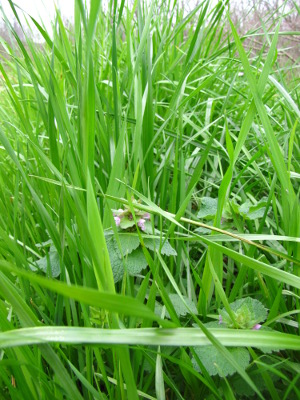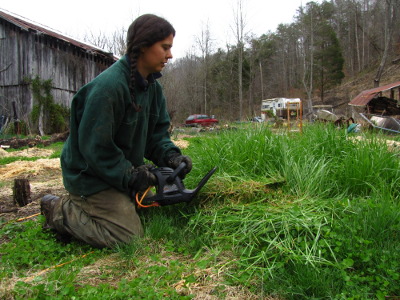
Cutting barley and ryegrass cover crops
 I finally got around to
cutting down the annual ryegrass and barley cover crops. I had
hoped they would die by themselves over the winter, but instead they
survived and have grown nearly a foot in this spring's warm weather. The biomass is much
appreciated, but only if I can turn it into soil organic matter before
time to plant vegetables in those beds.
I finally got around to
cutting down the annual ryegrass and barley cover crops. I had
hoped they would die by themselves over the winter, but instead they
survived and have grown nearly a foot in this spring's warm weather. The biomass is much
appreciated, but only if I can turn it into soil organic matter before
time to plant vegetables in those beds.
The electric
hedge trimmer made
short work of the barley but got bogged down in the ryegrass. I'm
sure the lawnmower would have done a better job there, but I'm always
leery of internal combustion engines after a long winter, so I just
cleaned the hedge trimmer blade every few minutes and plowed my way
through. One of these days, I'll find a scythe that fits me and
learn to use it so that I can cut my plants with humanpower.
After cutting, I mulched each
bed with an inch of manure and then a healthy dose of straw and last
 year's lawn clippings. Neither annual ryegrass nor barley is
supposed to reliably mow-kill, but I'm hoping that the mulch on top of
the weakened plants will make these cover crops lose heart. As
long as they don't sprout back up, I'll be happy.
year's lawn clippings. Neither annual ryegrass nor barley is
supposed to reliably mow-kill, but I'm hoping that the mulch on top of
the weakened plants will make these cover crops lose heart. As
long as they don't sprout back up, I'll be happy.
Want more in-depth information? Browse through our books.
Or explore more posts by date or by subject.
About us: Anna Hess and Mark Hamilton spent over a decade living self-sufficiently in the mountains of Virginia before moving north to start over from scratch in the foothills of Ohio. They've experimented with permaculture, no-till gardening, trailersteading, home-based microbusinesses and much more, writing about their adventures in both blogs and books.
Want to be notified when new comments are posted on this page? Click on the RSS button after you add a comment to subscribe to the comment feed, or simply check the box beside "email replies to me" while writing your comment.

http://www.youtube.com/watch?v=0mqFl86BOck
Check out the scythe instruction and how to get started. It seems easier than you might think.
Here in Arkansas, Rye grass is aggressive in the spring time. It will choke out many early weeds. It normally dies back with the summer heat, to emerge again in the late fall. So maybe dies isn't the right word, maybe it just goes dormant? Hay pastures are planted with rye to choke out the spring weeds so that when summer hits the Bermuda grass can grow.
I think rye grass wasn't the best choice for a cover crop. I would suggest covering it with black plastic and possible (I hate to say it) tilling it under a few times. I don't think thick mulch will kill it out. And I think it will just grow back when uncovered.
Vester --- it's not using the scythe that's holding me back, but getting a small enough one that it can be adjusted to suit me. I have a scythe that's supposed to be one size fits all, but I can barely keep the blade from cutting into the ground by holding my arms up high. I just need to find the right scythe!
Erich --- I agree --- I shouldn't have planted it. I knew there would be some duds when I tried so many cover crops, and these are the duds.
That said, this is annual ryegrass, which is very different from rye. It's a lot more like a grass and less like a grain, so I hope it's not quite so vigorous. Only time will tell, though!